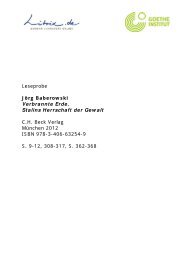Anne C. Voorhoeve Lilly unter den Linden Ravensburger ...
Anne C. Voorhoeve Lilly unter den Linden Ravensburger ...
Anne C. Voorhoeve Lilly unter den Linden Ravensburger ...
You also want an ePaper? Increase the reach of your titles
YUMPU automatically turns print PDFs into web optimized ePapers that Google loves.
Translated extract from<br />
<strong>Anne</strong> C. <strong>Voorhoeve</strong><br />
<strong>Lilly</strong> <strong>unter</strong> <strong>den</strong> Lin<strong>den</strong><br />
<strong>Ravensburger</strong> Buchverlag<br />
Ravensburg 2004<br />
ISBN 3-473-35251-9<br />
pp. 108-116, 168-171, 173-175, 177-180<br />
<strong>Anne</strong> C. <strong>Voorhoeve</strong><br />
<strong>Lilly</strong> under the Lin<strong>den</strong>s<br />
Translated by Anthea Bell<br />
© Litrix.de 2005
[From Chapter 11, pp. 108–116]<br />
My mother had picked a specially nice place to tell me the news: a café ship in Hamburg<br />
harbour. She’d put her hair up in a soft chignon, she was wearing a brightly coloured blouse with<br />
her jeans, and she looked so young and beautiful that several boys at the next table kept looking<br />
at us. I was almost bursting with pride, particularly because since Pascal had come into our lives<br />
it was unusual for the two of us to go out on our own without him. The waitress brought two<br />
large ice-cream sundaes. Nothing in the world could have prepared me for what Mami had to<br />
say.<br />
“<strong>Lilly</strong>,” she began sud<strong>den</strong>ly after a while, “I’m so very glad I have you. Perhaps you<br />
don’t know it because I haven’t said it often enough, but … well, knowing you’re there gives me<br />
so much strength. When I look at you I just know I can do practically anything …”<br />
I looked at her, baffled. “Like what?” I asked.<br />
“For instance,” said Mami, taking a deep breath, “for instance I’d know I could rely on<br />
you absolutely if I had to go into hospital for quite a long stay.”<br />
I put my spoon down. My mouth was sud<strong>den</strong>ly dry in spite of the ice-cream sundae.<br />
“Hospital?” I asked, alarmed.<br />
“Yes,” said Mami in a steady voice. “It seems I need to have an operation. But don’t<br />
worry, I’m sure it will turn out all right, and Pascal is going to take time off work and look after<br />
both of you.”<br />
“When?” I whispered.<br />
“Soon,” Mami whispered back. “Next week.”<br />
My eyes filled with tears. “For quite a long stay?”<br />
Mami was drawing on the tablecloth with her finger. She didn’t look at me. “I think so.<br />
The post-operative treatment is rather trying. They want to keep me in hospital for that. But I’ve<br />
decided to enjoy it all! I’ll really let them spoil me for a few weeks!”<br />
When she looked up with a smile and glanced at me, I knew that she was terrified.<br />
“What sort of disease is it?” I asked quietly.<br />
I knew of only two really serious diseases, cancer and AIDS, and I knew those two only<br />
by name. “It’s a little tumour in my breast,” said Mami.<br />
“But it’s not cancer, is it?” I asked with a small, scared smile.<br />
“What do you know about cancer?” she asked back.
So it was. A buzzing started up in my ears, all of a sud<strong>den</strong> my fingertips were icy cold. “I<br />
know most people get better these days,” I heard myself saying. “There was something about it<br />
on TV the other day.”<br />
“There was?” I’d seen nothing of the kind on TV, but sud<strong>den</strong>ly Mami looked much more<br />
cheerful. “That’s what they told me too. Everything will be all right, <strong>Lilly</strong>, I’m sure it will, you<br />
wait and see …”<br />
Everything will be all right, everything will be all right. Today, there was a fat woman<br />
eating apple tart at the place where Mami had been sitting, and I looked right across the café at<br />
her and tried to keep on persuading myself: everything will be all right …<br />
“Have you ever been here before?” asked Frau Gubler, smiling at me over the top of the<br />
menu. It was another Wednesday, and once again she’d thought up a special treat.<br />
cancer.”<br />
“Yes, with my mother,” I told her, deliberately adding, “When she told me she had<br />
Frau Gubler was left speechless for a moment. I felt almost sorry for her, because how<br />
could she have known that this café ship was one of the most dreadful places in the world for<br />
me? “I recommend the Black Forest sundae,” she said bravely. “That’s what I always have<br />
myself.”<br />
I looked at the menu and pretended that the letters made sense to me. But in fact I<br />
couldn’t get any further than the first line: pot of coffee, pot of coffee, pot of coffee. “Isn’t it<br />
boring, always having the same sundae?” I asked in a scratchy sort of voice.<br />
“There are some things you can always be sure of,” explained Frau Gubler. “And you can<br />
pass on what you know about them to other people …”<br />
But not to me, I thought. When the waitress came to our window table , and Frau Gubler<br />
had ordered a Black Forest sundae and two cocoas, I closed the menu and said, “An almond<br />
cake!” and I gave Frau Gubler a look telling her straight that she’d better keep what she knew to<br />
herself.<br />
“Well now,” she said as if she didn’t get the idea at all, “tell me, how’s school?”<br />
I looked past her and out of the window.<br />
“You don’t like it there very much, am I right?” she said in honeyed tones. “I might feel<br />
the same myself, with only other females around …” She leaned forward. “I’ve been thinking,<br />
<strong>Lilly</strong>. It will soon be the Christmas holidays. You don’t want to stay at the boarding-school on<br />
your own then, I’m sure.”<br />
2
Somewhere inside me alarm bells began ringing, although I couldn’t have said why. I<br />
knew that Frau Gubler had been talking to the headmistress of my school, and one of the things<br />
they’d discussed was my habit of going for walks at night. I’d expected to be told off about that,<br />
and it made me rather nervous that no such thing had happened yet. This outing to the ship, all<br />
that about Christmas … somehow I couldn’t make sense of it.<br />
“We might be able to place you somewhere provisionally,” said Frau Gubler enticingly.<br />
“If you’d like that.”<br />
“What do you mean, place me?” I asked, all confused.<br />
“With a family.”<br />
Sud<strong>den</strong>ly there were photographs spread out on the table.<br />
“These are the Bertrams,” said Frau Gubler. “Jens and Margit and their two sons. The<br />
boys are a bit older than you, and they’re foster children too. It’s a really nice family. Look, they<br />
have a dog as well!”<br />
know you.”<br />
“Foster children?” I repeated, at a loss.<br />
“Yes, this is a foster family, <strong>Lilly</strong>. I told them about you, and they’d be very glad to get to<br />
The shock brought my powers of speech back. “But I already have a family.”<br />
“Your aunt, yes, I know.” There was a faint hint of irritation in Frau Gubler’s voice. “It<br />
was really good that she was able to come to the funeral. Who knows, perhaps you can visit her<br />
some time. The Bertrams wouldn’t mind, anyway.”<br />
“The Bertrams? Hang on a moment!” I cried.<br />
But Frau Gubler was going steadily on. “This would be for life, <strong>Lilly</strong>. A family you really<br />
belong to, a family to be there for you and love you.”<br />
An arm reached past me and put something down on the table. Sud<strong>den</strong>ly Frau Gubler had<br />
a large sundae in front of her. “No one can live without people to love them. Not even you,<br />
<strong>Lilly</strong>.”<br />
“But I do have someone,” I managed to say.<br />
“Not here, though,” replied Frau Gubler quick as a flash.<br />
“Suppose I go over there?”<br />
So now my secret was out. I held my breath. Frau Gubler leaned back, impatiently.<br />
“Let’s talk sens ibly, shall we?” she said, sounding annoyed. “Your relations live in the<br />
East! You can write to them, they’ll always be glad of parcels, I’m sure even a visit will be<br />
3
possible. If it were France – well, no problem there! But the German Democratic Republic?<br />
<strong>Lilly</strong>, that’s the hardest border in all Europe to cross. And even if …”<br />
“If what?” I persisted, although I was feeling paralysed.<br />
“Well,” said Frau Gubler thoughtfully, “I don’t know of any such case, but even if<br />
something could be done at consular level, there’d still be the question of school and your aunt’s<br />
living conditions. They aren’t to be compared with ours, you know. Someone would have to go<br />
there and make sure they were acceptable.”<br />
“And this – this consular thing?” I persisted. “How long would that take?”<br />
“Three months,” she estimated. “Six months. Maybe a lot longer. I’m sure you don’t<br />
want to wait all that time!”<br />
My despair must have been obvious, because Frau Gubler’s face softened, she leaned<br />
over the table and took my hand. “The Bertrams would give you a lovely room! And I haven’t<br />
told you the best part of it yet. They live in Eppendorf, so you could go to your old school again!<br />
How about that?”<br />
up …<br />
I was totally dazed. This could only be a nightmare. If I held my breath maybe I’d wake<br />
Frau Gubler let go of my hand again. “I’d be happy to pick you up on the twenty-third.”<br />
“The twenty-third?” I repeated faintly. “But that … that’s the day after tomorrow!”<br />
Frau Gubler nodded encouragingly.<br />
My answer probably had more far-reaching consequences than any other white lie I’d<br />
told in the whole of my life. “Oh, but that’s no good,” I said, summoning up the last of my<br />
strength and surprised to hear how firm my voice sounded. “That’s Pascal’s birthday. We’re<br />
going to celebrate it together, we fixed that ages ago.”<br />
Frau Gubler’s face involuntarily clouded; she realised that she couldn’t deprive me of the<br />
last remaining member of my family. “Very well,” she said reluctantly. “On the twenty-fourth,<br />
then – but in the morning! I’m going to my own family on Christmas Eve too,” she told me,<br />
smiling. “To Lübeck!”<br />
How we passed the rest of that nightmare afternoon and how I got from the ship to the telephone<br />
booth I can’t say. Pascal says the booth was so clouded up with my tears that passers by outside<br />
kept a careful distance from it, obviously fearing chemical experiments, drug abuse or tricks with<br />
concealed cameras. Personally I was sitting under the sticker telling you how to make emergency<br />
4
calls, and crying so hard that I couldn’t even see who sud<strong>den</strong>ly flung the door open and took me<br />
in his arms.<br />
Then we were sitting in the dark little kitchen of Pascal’s shared apartment , and it was all<br />
over with that kindly sympathy of his. “You can’t cross over to the East, it’s absolutely out of the<br />
question!” he barked at me. “Your mother must be turning in her grave!”<br />
“Do you think Mami was happy here?” I sobbed. “She was all alone! If she’d stayed at<br />
home Lena would have been sitting beside her bed when she died.”<br />
“At home!” repeated Pascal, hurt. “I see. So over there is ‘at home’ already, is it?”<br />
Jan and Marc, already well known to me from Pascal’s accounts of them as “the boys”,<br />
tried to keep the peace between us. Marc, the elder, was a journalist on a movie magazine and<br />
had such thick glasses that his eyes shrank almost to the size of buttons behind them. The other<br />
man, Jan, presented a radio show, which meant he had to get up at four every morning and do<br />
peculiar voice exercises in the bathroom. At first they’d made Pascal think he suffered from<br />
terrible digestive trouble. “A child belongs with its family,” said Marc, looking at me<br />
sympathetically with his button eyes.<br />
“Oh, terrific, now you’re encouraging her!” said Pascal crossly. “A great many sacrifices<br />
were made so that <strong>Lilly</strong>’s mother could live here in freedom!”<br />
freedom.”<br />
“Freedom?” replied Marc. “<strong>Lilly</strong>’s not being allowed to leave the country. That’s not<br />
“For heaven’s sake, she’s still a child!” cried Pascal angrily. “What’s more, there are …”<br />
and he lowered his voice, “there are, well, complications in the background! I’m not at all sure<br />
that Lena’s family would actually take her in …”<br />
I stopped crying. “What?” I asked incredulously. “You think Lena wouldn’t want me?”<br />
For a moment it was perfectly quiet. I thought I saw Pascal duck his head slightly.<br />
“Yes, yes, of course she would,” he hastily assured me. “But the thing is, it’s not just up<br />
to her. How do we know what her husband and children …”<br />
“What did you mean a moment ago about sacrifices?” I interrupted him.<br />
We stared at each other. Then Pascal lowered his eyes, and I sud<strong>den</strong>ly felt the same sense<br />
of fear as when I’d found Lena’s letters.<br />
“Why not go there in the holidays?” suggested Jan.<br />
“Oh yes, and she crosses back over the border every night at twelve, or what?”<br />
5
“No, she doesn’t have to do that. If she has a personal invitation from a citizen of the<br />
GDR she can stay longer.”<br />
“Hear that, <strong>Lilly</strong>?” Pascal’s face brightened. “That’s an idea.”<br />
“It could take quite a while, though,” objected Jan. “It won’t be in time for Christmas<br />
now. All she can do is go there by way of Berlin on a day visa and just stay. Once she’s in, she’s<br />
in.”<br />
“Oh, shut up,” said Pascal angrily.<br />
“You take her over the border, you put her on the train for Jena and then you come back.<br />
What’s the problem?”<br />
“Who, me?” Pascal flung an arm in front of his chest like some actor in a classical<br />
tragedy. “Hold on a moment, this is child abduction you’re talking about!”<br />
“By the time they come looking for you,” said Marc, “you’ll be in Acapulco.”<br />
Pascal spoke fervently. “No. No, friends. Leave me out of this.”<br />
I just stood up and walked away. Before the door of the apartment closed after me, I<br />
heard one of the boys saying, “Are you really refusing to help her?”<br />
Pascal caught up with me in the front hall of the building, running downstairs two steps at<br />
a time. He caught me by the sleeve. “<strong>Lilly</strong>, wait a moment.”<br />
I tore myself free. “You said if I needed help you’d be there for me!” I shouted at him.<br />
“But all you can do is first let Mami down and then me!”<br />
Before I’d finished saying it I was sorry; Pascal was looking at me with such pain in his<br />
eyes that I burst into tears again. When the door closed he was still standing there absolutely still.<br />
Up on the first floor Jan was standing at the kitchen window giving me the thumbs-up sign, but I<br />
wouldn’t look.<br />
[From Chapter 16, pp. 168–171]<br />
My cousin Till had been given a bike for Christmas and was longing to try it out. At the same<br />
time, he volubly explained to us, he could make himself useful by showing me around. He said<br />
we could take the bikes by tram to a place called Ziegenhain, and then climb some tower called<br />
the Fuchsturm and enjoy the view. After that we could ride all the way downhill and see if the<br />
Diamant brand bicycle was all that its manufacturers claimed. Till asked Lena for sandw iches<br />
6
and a thermos of tea so that we could have refreshments while we were out. This speech of his,<br />
plus the description of everything I could expect to see and do on our expedition, took about ten<br />
minutes. My aunt and uncle looked a bit exhausted when their son finally came to the end of it.<br />
“What do you think, <strong>Lilly</strong>?” asked Lena. “Would you like that?”<br />
“You bet!” I said.<br />
Our departure was delayed because Till couldn’t manage to move the Carl Zeiss Jena<br />
Football Club pennant from his old kid’s bike to the carrier of the new one. Finally Lena fixed it<br />
in place with some flower wire, and we were off. “Tell him loud and clear when you want to<br />
come home,” Lena impressed on me. “Till’s stamina can sometimes be too much for other<br />
people.”<br />
here?”<br />
“Can I go anywhere, then?” I asked. “Suppose someone realizes I’m not from around<br />
“It’s all arranged about your visa,” said Lena. “Rolf will go to the register office with you<br />
after Christmas and you’ll get one made out in retrospect.”<br />
“As easy as that?” I beamed and hugged her.<br />
Lena patted my back. “Not entirely easy,” she said slowly. “But at least you can’t have<br />
any more trouble here.”<br />
That sounded wonderful. Yet I had a funny feeling that Lena looked a little depressed as<br />
she waved us goodbye.<br />
Till was very anxious to point out all the sights we passed on our way to catch the tram.<br />
(“That’s the street light where Papa <strong>den</strong>ted our Wartburg.”) I admired the buildings in the Old<br />
Town with their crumbling plaster and ornate little balconies, and the gas lamps dating from the<br />
time of the World War. Whole rows of houses were slowly deteriorating for want of building<br />
materials and paint, and in some places there were holes right in the middle of the road. Cars<br />
drove carefully around them. I was often reminded of the poorer parts of Hamburg – with the<br />
great difference that in spite of everything it all looked clean and neat here. The people who lived<br />
in these houses obviously minded about the dilapidation and tried to keep their surroundings up<br />
as well as they could. Many front doors had evergreen branches over them for Christmas, there<br />
were decorations in many of the windows, and the people we met replied to my greeting in a<br />
surprised but friendly way. There were smoking chimneys everywhere, and I imagined cosy little<br />
living rooms behind the wall of every building. It was like walking through a fairy-tale book.<br />
There was a feeling of promise in the air, as if the magic spell, the transformation, the future lay<br />
7
just ahead. To me, living between two worlds anyway at the time – somewhere in between the<br />
memory of my mother and my blurred impressions of the time after she died – it was as if I’d<br />
found a place where everything seemed to fit together again. I cycled through the Old Town<br />
feeling elated. I was home – at last!<br />
In the city centre, where more modern, plain, utilitarian buildings stood side by side, I<br />
noticed more of the strange notices like the one I’d already seen at the station. They had<br />
inscriptions on them in fat letters, saying things like: “Your Workplace is the Battlefield of<br />
Peace!” Or: “Learn eagerly, with heart and soul, / For Socialism is our goal!”<br />
“What’s all that in aid of?” I asked Till. “Who puts all these sayings up?”<br />
“The Party, of course.”<br />
“Why?”<br />
Till shrugged. “Mama says the Party wants to be with us wherever we go.”<br />
I stopped in front of one poster and read it. “Those who wish to maintain peace must fight<br />
against imp-eria-listic powers. Do you understand that?”<br />
“Of course,” said Till cheerfully. “You lot are the imperialists.”<br />
The difficult word fell smoothly from his lips. I was astonished.<br />
“Us? How do you mean?”<br />
Till’s face lengthened. “We haven’t got that far in school yet,” he reluctantly confessed,<br />
and next moment called out in a clear voice, “Here comes the tram!”<br />
I looked round in alarm. A penetrating squealing, grinding sound was approaching from<br />
the corner of the street, as if tanks with caterpillar tracks had already been sent out to track me<br />
down. Seconds later the tiny yellow tram appeared. It looked as if it had been borrowed from a<br />
kids’ roundabout, and it made a terrible racket as it clattered towards us.<br />
“Are we really going to fit in that with our bikes?” I asked incredulously. I’d turned my<br />
bicycle, ready to make my escape on it, but now I manoeuvred it back into position, feeling<br />
rather ashamed of myself.<br />
“You ask so many questions,” said Till, shaking his head.<br />
The tram was even cheaper than a ride on the kids’ roundabout. It cost us all of ten<br />
pfennigs each, bikes included, and took us several kilometres out of town into the picturesque<br />
outskirts of Jena. But I couldn’t really enjoy the journey. I was wondering how I ought to act. I’d<br />
had no idea that they actually put up posters here attacking us! Surreptitiously, I looked around<br />
the tram. The passengers all seemed perfectly harmless, but what would happen if they found out<br />
8
who was sitting among them? Would I even get a chance to protest that we in the West wanted<br />
peace too? Visa or no visa, I was really glad when we reached our stop, got out and could mount<br />
our bikes. I pedalled like mad to get away from that tram stop.<br />
[pp. 173–175]<br />
It was draughty and cold up there, some crows flew away from us cawing angrily, but Till had<br />
been quite right: we had a fine view of the town and its wooded hills and valleys. The windows<br />
of the university high-rise block, built in Mami’s youth and towering above Jena like a huge<br />
round fan heater, glittered in the sun. The buildings of the city centre clustered round it,<br />
comfortably puffing out little clouds of smoke towards the sky. Till had brought a pair of<br />
binoculars with him and patiently helped me to find our part of town, his school, Uncle Rolf’s<br />
publishing firm, the bookshop where Lena worked …<br />
“Bookshop?” I lowered the binoculars. “I thought she was a teacher?”<br />
Till looked at me in surprise. “Well, she couldn’t be any more. Didn’t you know?”<br />
I shook my head. Till hesitated. Then he said, “She didn’t keep a good enough watch on<br />
her little sister.”<br />
It was a few seconds before I realized what he was talking about. Even then I could<br />
hardly believe it. “Because of Mami? That can’t be true! You mean because Mami got out of<br />
here? But Lena couldn’t help that!”<br />
I must have been staring at Till in horror, because he turned cautious. You could see he<br />
was sorry he’d mentioned the subject at all. “She ought to have reported it, that’s all,” he<br />
reluctantly explained. “It’s funny you didn’t know about tha t.”<br />
My mind sud<strong>den</strong>ly felt completely blank. I realized that I was still standing with Till on<br />
top of the tower, the binoculars in my hand, the same peaceful winter landscape before my eyes<br />
as a couple of minutes ago. But sud<strong>den</strong>ly I saw border fences again, the mirror under the car, the<br />
closed U-Bahn tunnels below the Berlin streets.<br />
“Listen, it’s a long time ago,” said Till, trying to cheer me up. “Don’t let it worry you.<br />
Mama spends all day with books now, and there’s nothing my parents like better! Katrin says it’s<br />
a wonder we’re here at all, because they never do anything in bed but read.”<br />
I gave him back the binoculars. Till looked at me uncertainly.<br />
9
[pp. 177–180]<br />
“Shall we ride downhill now?” he asked hesitantly.<br />
I shook myself. “Sure, why not? How about a race?”<br />
“Yes!” shouted Till jubilantly, and ran down the steep steps ahead of me.<br />
Up in the apartment I washed the blood off the place where the branch had whipped into my face<br />
on the ride down from the Fuchsturm. I could hear Katrin playing the guitar in her room. She<br />
was strumming the instrument rather tunelessly, I thought; it seemed more like noise than music.<br />
I had no idea that she’d had a serious conversation with her parents that morning – a<br />
conversation about me, what else? It made Katrin play her guitar all the more angrily and<br />
defiantly, and she gave me a welcome to match when I walked straight into the room to get<br />
something out of my backpack. “What is it now? What are you doing here?” she snapped at me.<br />
“Well, I left my things …” I began, but I got no further. Katrin flung her guitar on the bed<br />
and planted herself in front of me.<br />
“Let me tell you something. You may be sleeping on my couch, but that doesn’t mean<br />
you can waltz in here just whenever you like! This is still my room!”<br />
“But Katrin,” I said helplessly.<br />
“But Katrin!” she imitated me nastily. “Take your stuff and get out of here. And that’s<br />
how we’ll do it every morning. I suppose we’ll manage to survive these few days somehow.”<br />
There was a slight noise in the doorway. Till was standing there, listening with a severe<br />
expression on his face.<br />
“What do you mean – these few days?” I repeated.<br />
“Until they send you home again. You don’t seriously think you can stay here, do you?”<br />
asked my cousin coldly.<br />
behind me.<br />
I picked up my backpack, left the room without a word, and even slammed the door<br />
“I’ve had about enough of this ,” I said to Till, but I couldn’t keep my voice from<br />
trembling in a suspicious sort of way and tears of rage from coming to my eyes as I took my<br />
10
things into the living room. I’d rather sleep curled up there under the dining table than set foot in<br />
Katrin the dragon’s lair one more time! Even if she went on her bended knees to ask me!<br />
The front door of the flat opened and Lena and Uncle Rolf came into their peaceful home<br />
looking cheerful. “Hello, <strong>Lilly</strong>, where are you off to?” asked Lena in surprise, seeing me with my<br />
backpack.<br />
Till took a deep breath. “Katrin says <strong>Lilly</strong> can’t be in her room in the daytime,” he told<br />
her excitedly. “She has to take her things out of it every morning!”<br />
Lena’s eyes narrowed to small slits. Her mouth became a thin line. I’d never have<br />
thought my kind aunt Lena could look so fierce, and I instinctively took a step back, but of<br />
course the explosion that threatened was not meant for me. Lena turned on her heel and marched<br />
into Katrin’s room. The last thing we heard before she slammed the door after her was her<br />
saying, “We’ll see about this.”<br />
Till and Uncle Rolf looked at each other. “Oh wow!” murmured Till expectantly.<br />
We were standing in the hall, and I was still holding my half-open backpack. I was<br />
feeling rather awful. Since I first set foot on East German soil, which was less than twenty-four<br />
hours ago, my relations had had the police in the ir home, they’d had to sort things out with the<br />
State Security Service, Lena had quarrelled with Rolf, both of them had quarrelled with Katrin<br />
and Katrin had quarrelled with me, Christmas dinner had got cold, and I’d lost count of the<br />
number of doors that had been slammed.<br />
things alone!”<br />
Behind the door you could hear Katrin shouting, “Are you crazy or what? Leave my<br />
It sounded as if Lena had made straight for Katrin’s wardrobe to begin clearing out some<br />
of the shelves for me. “And can you tell me just what, in your opinion, we should do?” she<br />
shouted back.<br />
“Send her home!” yelled my cousin.<br />
“So where do you think is her home?”<br />
“What’s that to do with me? She’s only got her mother to thank, after all. She ran off,<br />
didn’t she? Or her father, what business did he have climbing mountains? They never thought of<br />
other people, so why should I?” We could hear thumping on the wardrobe door as Katrin made<br />
for her mother and tried to get the pile of clothes away from her.<br />
all.”<br />
“You scare me, Katrin,” I heard Lena say. “Sometimes I feel as if I don’t know you at<br />
11
Then something puzzling happened. Katrin answered in a voice that was deep with<br />
bitterness. “I can understand that. Maybe I wouldn’t love my child either if I’d blotted out those<br />
first three years.’<br />
At these words my uncle jumped as if a bolt of lightning had gone through him. He<br />
hurried towards me and took my things from me. “How about a nice hot cocoa?” he asked in an<br />
unusually loud voice. “And there’s still plenty of Christmas cake left.”<br />
I stood there frozen to the spot. “Do you know how I fought for you?” came Lena’s<br />
agitated voice through the door. She sounded as if she was shaking Katrin. “How I kicked and<br />
scratched and shouted the whole place down …”<br />
Uncle Rolf took Till’s arm and mine and led us straight to the kitchen, where he shut the<br />
door firmly after us. “What have you done to your face?” he asked, touching the scratch on my<br />
cheek. “Would you like a plaster?”<br />
“No, thank you,” I said in a high voice. “It’s all right.”<br />
But Uncle Rolf searched about in the drawers, making a lot of noise, finally found a little<br />
box of plasters and stuck one on my face.<br />
“That doesn’t look too good, Papa,” objected Till.<br />
The door opened and Lena came in. She was white as a sheet, but her voice sounded<br />
perfectly normal as she led me back into Katrin’s room. “There, <strong>Lilly</strong>,” she said, “the two of us<br />
will put your things away in the wardrobe now. That will be much better for them than lying<br />
about in a musty backpack.”<br />
I watched her clear out my backpack, and I saw how her hands trembled. I felt like<br />
crying, though I didn’t know why. There was no sign of Katrin. When Till signalled to me from<br />
the door I went back into the kitchen with him. I don’t think Lena even noticed.<br />
From the kitchen window, we saw Katrin carrying a small case and her guitar across the<br />
yard to the summerhouse. “She’s moving out again,” explained Till. “She’ll be back by supper-<br />
time at the latest.”<br />
But Katrin wasn’t back by supper-time, or later when we all went to bed. She spent the<br />
whole night in the cold, dark summerhouse, and even at breakfast it didn’t look as if she intended<br />
to come home again.<br />
12



![PDF anzeigen [65 KB]](https://img.yumpu.com/21718989/1/184x260/pdf-anzeigen-65-kb.jpg?quality=85)


![show PDF [5522 KB]](https://img.yumpu.com/21308533/1/184x260/show-pdf-5522-kb.jpg?quality=85)
![PDF anzeigen [36 KB]](https://img.yumpu.com/21240334/1/184x260/pdf-anzeigen-36-kb.jpg?quality=85)

![Mostrar PDF [68 KB]](https://img.yumpu.com/14286441/1/184x260/mostrar-pdf-68-kb.jpg?quality=85)







